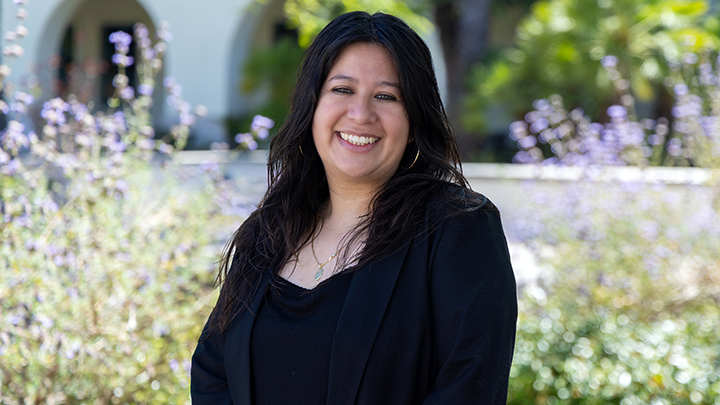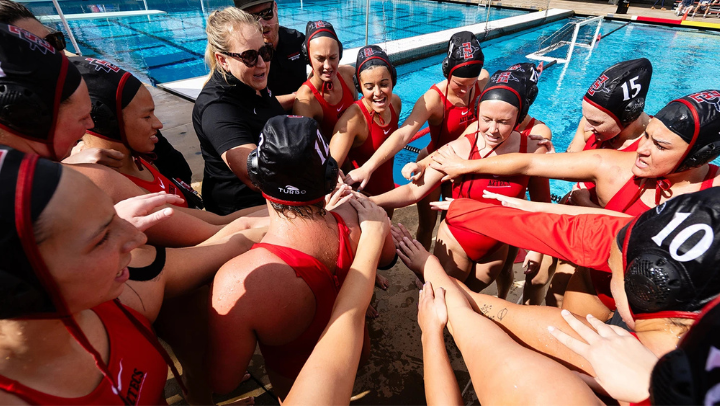CSU trustees’ scholarship extends a love for learning
SDSU psychology student Maria Christina Huerta-Avila is being recognized with an award that will help propel her study of the brain.

Updated 7:30 a.m. Sept. 25, 2024
Over years of watching her older brother cope with the debilitating effects of a ruptured brain aneurysm and subsequent stroke, Maria Christina Huerta-Avila became more and more interested in the underlying mysteries and subtle changes of his condition.
Why can he remember his nieces’ names and birthdays, but not what he had for breakfast? How is he able to walk, with a cane, when doctors told the family to prepare for a possible life in a vegetative state? What accounts for his switch from being right-handed to left-handed?
Just four years old when her then-teenage brother was stricken, Huerta-Avila dove into a college-level psychology course in place of a free period as a senior at San Diego’s Southwest High School.
“I was just enamored, I was just amazed,” Huerta-Avila recalled. “I learned about psychology for the first time, and I loved everything about it.”
It turned out to be the first step toward a career choice she’s now pursuing at San Diego State University with some help from a California State University (CSU) scholarship.
Huerta-Avila was honored Tuesday by the CSU Board of Trustees with a Trustees’ Award for Outstanding Achievement, which comes with $10,000 in donor-funded financial aid to continue her academic journey. The trustees’ scholarships are bestowed each September, one for each of the system’s 23 campuses, for students who demonstrate superior academic performance, personal accomplishments, community service, and financial need.
The awards are provided through donations primarily from former CSU board members and officials, and additional supporters. Huerta-Avila’s award is named for Jack McGrory, a current trustee and prominent SDSU philanthropist.
It has been an untraditional path for her. Community college and two transfers to SDSU, originally as an accounting major, took place over a period of more than 20 years as Huerta-Avila took breaks to raise three daughters (all now in their teens) as a single, stay-at-home mom and school volunteer. She returned to SDSU this past fall.
Now she’s majoring in psychology with a planned emphasis in neuroscience, the study of the brain. She entered SDSU’s MARC (Maximizing Access for Research Careers) program, a training ground for next-gen biomedical scientists supported by the National Institutes of Health (NIH).
Huerta-Avila also is working in the psychology department’s NeuroCognition Lab, where research is being done on the neuronal underpinnings of language comprehension, a head start to her own future research ambitions to explore “the connection between language and the brain.”
MARC Program Coordinator Michelle Altemus nominated Huerta-Avila for the trustees’ award.
“She is one of the hardest working students I have had the pleasure of meeting over the past five years,” Altemus wrote in response to an email request for comment. Huerta-Avila’s “work ethic, combined with her genuine curiosity and thirst for knowledge have allowed her to thrive thus far as an undergraduate student and will surely lead to her continued success as she pursues doctoral study.”
“She is truly grateful for any opportunities that are provided to her,” Altemus continued, “and is always eager to pay it forward by giving back to the programs that supported her as well as helping her classmates and her community at large.”
MARC is a two-year commitment, and her ramped-up undergraduate experience has pushed graduation for Huerta-Avila to at least spring 2026. That’s OK with her: “I love this environment, I love learning, and I have an opportunity to stay another year and to better prepare for applying to graduate school.”
She then wants to enroll in a joint Ph.D. program in clinical psychology or neuroscience and continue as a researcher in the field.
Huerta-Avila was a previous scholarship recipient from the Smoke and Vape-Free Latinx Scholars Initiative, a collaboration of SDSU and Southwestern College and part of California’s Tobacco-Related Disease Research Program.
The scholarship led to a project in SDSU’s Center for Tobacco and the Environment, honored with an Undergraduate Research Excellence Award in SDSU’s Student Symposium in March.
The project examined tobacco-, electronic smoking/vaping- and cannabis waste in the sidewalks, landscaping and blacktops around two adjacent office buildings: one with no-smoking policies except at a designated outdoor smoking area, the other without smoking policies in place and large ashtrays around the building.
Contrary to expectations, the supposedly smoke-free property had only 39% less discarded cigarette butts than the neighboring building. Worse yet, the building that provided large ashtrays around their property had numerous cigarette butts scattered immediately adjacent to the outdoor ashtrays.
“It was everywhere,” said Huerta-Avila. The findings, she said, were an indication no-smoking policies in outdoor areas are not entirely effective ― and smokers still have a lot to learn about tobacco, e-cigarette and cannabis waste impacts the environment.
Huerta-Avila said she’s grateful for the trustee scholarship and the opportunities it gives her to advance her education.
She has some company on her commute. Her eldest daughter is a second-year student at SDSU, also studying psychology.
This semester they’re sharing a classroom, Introduction to Linguistics.
(Updated following a presention to the CSU Board of Trustees.)



